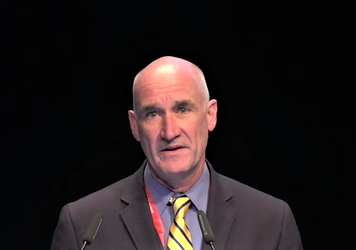 Dr Kevin Flaherty (Credit: ERS photo)
Dr Kevin Flaherty (Credit: ERS photo)The tyrosine kinase inhibitor nintedanib significantly delayed progression of a wide range of fibrosing interstitial lung diseases (ILDs) other than idiopathic pulmonary fibrosis (IPF) compared with placebo, according to the INBUILD* study presented at ERS 2019.
While nintedanib has been shown to be effective and was FDA-approved for treating IPF, its role in other types of fibrosing ILDs with a progressive phenotype (ie, worsening over time) remains unknown.
According to invited discussant Professor Martin Kolb from McMaster University in Hamilton, Canada, approximately 75 percent of ILDs consist of non-IPF aetiologies, which currently “we have no drugs [for], so there is a big medical need.”
In the INBUILD study, nintedanib more than halved the annual rate of lung function decline measured by forced vital capacity (FVC) vs placebo over 52 weeks, both in the overall study population as well as the patient subgroup with a UIP-like fibrotic pattern identified on high-resolution computed tomography (HRCT) imaging. [ERS 2019, abstract RCT 1881; N Engl J Med 2019;doi:10.1056/NEJMoa1908681]
At 52 weeks, the annual rate of FVC decline was lowered by 57 percent with nintedanib vs placebo (-80.8 vs -187.8 mL/year; p<0.001) in the overall population and by 61 percent (-82.9 vs -211.1 mL/year; p<0.001) in patients presenting with a UIP**-like fibrotic pattern.
The magnitude of treatment benefit with nintedanib was similar to that seen in patients with IPF from the INPULSIS trials, according to Dr Kevin Flaherty from the University of Michigan in Ann Arbor, Michigan, US, who presented the study at ERS 2019.
“Beyond exploring the effects of nintedanib, the INBUILD trial provided insights into the natural history of progressive fibrosing ILDs,” said Flaherty and colleagues. “These data support the hypothesis that progressive fibrosing ILDs, regardless of clinical diagnosis, have a similar pathobiologic mechanism [leading to fibrosis].”
The multinational, double-blind, phase III trial randomized 663 patients (mean age 65.8 years, 53.7 percent male) with fibrosing lung disease affecting >10 percent of lung volume to receive nintedanib 150 mg twice daily or placebo in a 1:1 ratio.
“Patients who received nintedanib had a slower rate of progression of ILDs than those who received placebo, independent of the fibrotic pattern on HRCT,” reported Flaherty and co-authors, who noted that the treatment effect was consistent across subgroups with a UIP-like fibrotic or other fibrotic patterns (adjusted difference in annual FVC decline rate between treatments, 127.8 and 75.4 mL/year, respectively; p=0.23 for interaction) in favour of nintedanib.
Nonetheless, changes in health-related quality of life from baseline were small, as indicated by the K-BILD questionnaire, with no meaningful difference between groups.
In terms of safety, diarrhoea was the most frequently-reported adverse event, occurring in 66.9 percent vs 23.9 percent in the nintedanib arm vs the placebo arm, respectively, which according to Flaherty, was consistent with that observed in patients with IPF. Nausea and vomiting were also more common among the nintedanib-treated patients than those receiving placebo. In addition, abnormalities on liver-function testing, such as elevations in aspartate aminotransferase or alanine aminotransferase, occurred at higher rates in the nintedanib than the placebo arms.
“This finding is remarkable in the context of the trial population, which included patients with a variety of underlying ILDs,” wrote Dr Hilary Goldberg of Brigham and Women's Hospital in Boston, Massachusetts, US, in an accompanying editorial. [N Engl J Med 2019;doi:10.1056/NEJMe1911794]
“The use of nintedanib may slow the disease progression, but our challenge for the future is to design studies that identify earlier targets to prevent the establishment of this still highly morbid condition,” she commented.